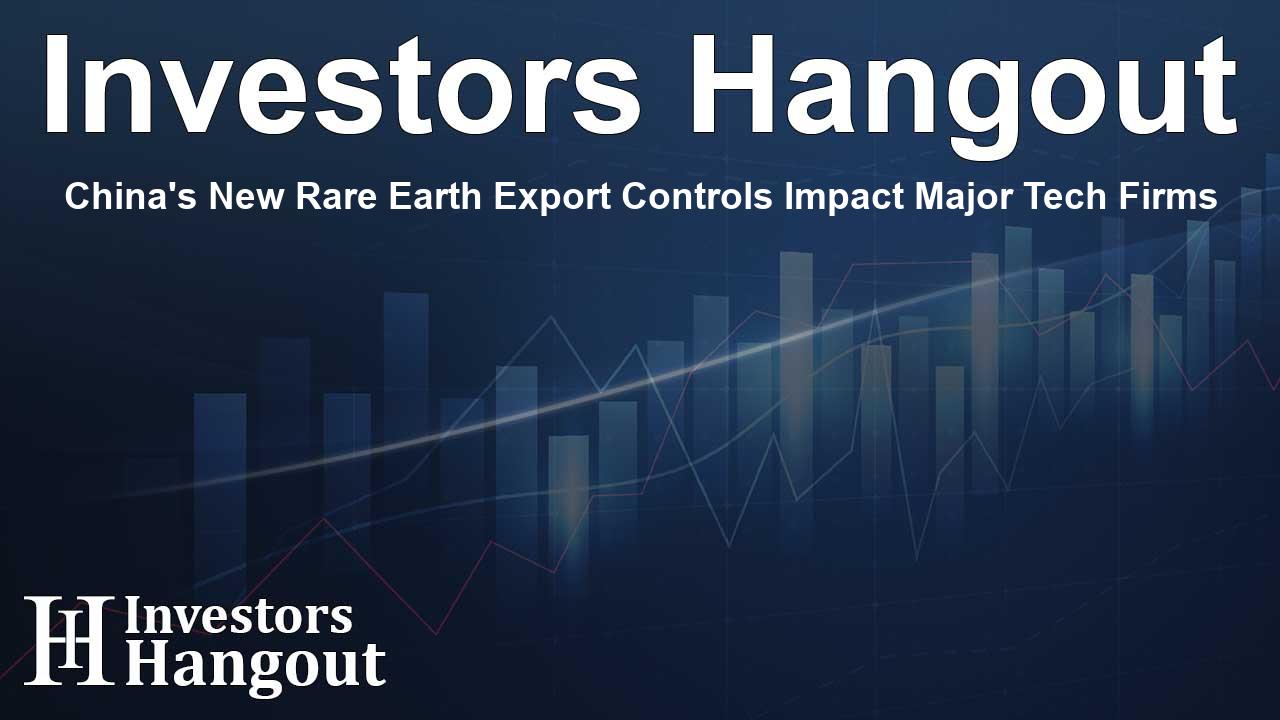China's New Rare Earth Export Controls Impact Major Tech Firms

China Enacts Stricter Rare Earth Export Regulations
China has recently implemented stricter export regulations on rare earth minerals and related technologies, a move that escalates tensions in global trade, particularly with the United States. This measure has come to light ahead of a pivotal meeting between U.S. President and Chinese leadership.
New Rules Aimed at Safeguarding National Security
The Ministry of Commerce of China has mandated that foreign companies require approval to export magnets with even minute traces of Chinese-sourced rare earth materials. Additionally, this applies to those produced using Chinese extraction methods, refining technologies, or magnet-making techniques. Such regulations reflect China’s aim to reinforce its national security and prevent potential misuse of these critical materials.
Currently, China dominates the rare earth market, managing approximately 70% of global mining, 90% of processing, and a staggering 93% of magnet production. The new measures are designed to control the flow of these materials, especially in high-stakes industries such as defense and advanced technology.
Case-by-Case Evaluation for High-Tech Applications
Under the new policies, applications related to cutting-edge technologies—such as computing, memory chips, and artificial intelligence with military implications—will undergo rigorous scrutiny on a case-by-case basis. This intensifies the regulatory landscape for companies that rely on rare earth elements for their innovations.
Tech Giants Prepare for Potential Disruptions
The ramifications of these new rules could be significant for major technology companies like Apple Inc. (NASDAQ:AAPL), Tesla Inc. (NASDAQ:TSLA), and NVIDIA Corp (NASDAQ:NVDA). These firms are heavily reliant on rare earth elements for their products ranging from electric vehicles to advanced computing systems.
In response, the United States has been actively working to create a more resilient supply chain for rare earth materials. Economic experts believe that the U.S. can navigate this challenge by exploring alternative sources and initiatives.
Alternative Supply Sources Emerging
Notably, Pakistan has recently engaged in exports of enriched rare earth elements to the U.S., marking the launch of a significant partnership valued at $500 million. This effort represents a step toward diversifying the supply landscape, bolstering U.S. access to critical materials.
Moreover, increased investments from the U.S. government in mining operations like MP Materials Corp (NYSE:MP) signal a commitment to strengthening domestic production capabilities for rare earth elements.
Investing in Rare Earth ETFs
This evolving situation presents new opportunities for investors. Various exchange-traded funds (ETFs) focused on rare earth and strategic metals are becoming increasingly attractive. Notable options include the VanEck Rare Earth/Strategic Metals ETF (NYSE:REMX), the Global X Lithium & Battery Tech ETF (NYSE:LIT), and the iShares U.S. Basic Materials ETF (NYSE:IYM). These funds are well-positioned to benefit from an increase in domestic production efforts spurred by new supply initiatives.
Conclusion: Navigating a Changing Landscape
The emergence of strict export controls by China on rare earth materials is a pivotal development that will undoubtedly have implications for global technology markets. Companies like Apple, Tesla, and Nvidia must adapt their strategies to address the evolving supply chain challenges posed by these regulations. As the U.S. looks to secure its supply of these essential materials, exploring alternative partnerships and diversifying investment options may prove to be crucial steps in maintaining technological leadership.
Frequently Asked Questions
1. What are rare earth elements, and why are they important?
Rare earth elements are a group of 17 minerals vital for manufacturing advanced technologies, including smartphones, electric vehicles, and renewable energy technologies.
2. How do China's export regulations affect US tech companies?
China's export regulations may create supply chain vulnerabilities for US tech companies, increasing costs and making it harder to source essential materials.
3. What actions is the US taking in response to these regulations?
The US is actively seeking to secure its supply chain, partnering with other countries for rare earth imports and investing in domestic mining operations.
4. What impact might these regulations have on the market?
The new regulations could lead to increased prices for rare earth materials, affecting production costs for technology companies and potentially leading to supply disruptions.
5. What are some investment opportunities amid these changes?
Investors may consider ETFs that focus on rare earth elements and strategic metals, as well as companies involved in domestic mining and production.
About The Author
Contact Addison Perry privately here. Or send an email with ATTN: Addison Perry as the subject to contact@investorshangout.com.
About Investors Hangout
Investors Hangout is a leading online stock forum for financial discussion and learning, offering a wide range of free tools and resources. It draws in traders of all levels, who exchange market knowledge, investigate trading tactics, and keep an eye on industry developments in real time. Featuring financial articles, stock message boards, quotes, charts, company profiles, and live news updates. Through cooperative learning and a wealth of informational resources, it helps users from novices creating their first portfolios to experts honing their techniques. Join Investors Hangout today: https://investorshangout.com/
The content of this article is based on factual, publicly available information and does not represent legal, financial, or investment advice. Investors Hangout does not offer financial advice, and the author is not a licensed financial advisor. Consult a qualified advisor before making any financial or investment decisions based on this article. This article should not be considered advice to purchase, sell, or hold any securities or other investments. If any of the material provided here is inaccurate, please contact us for corrections.
